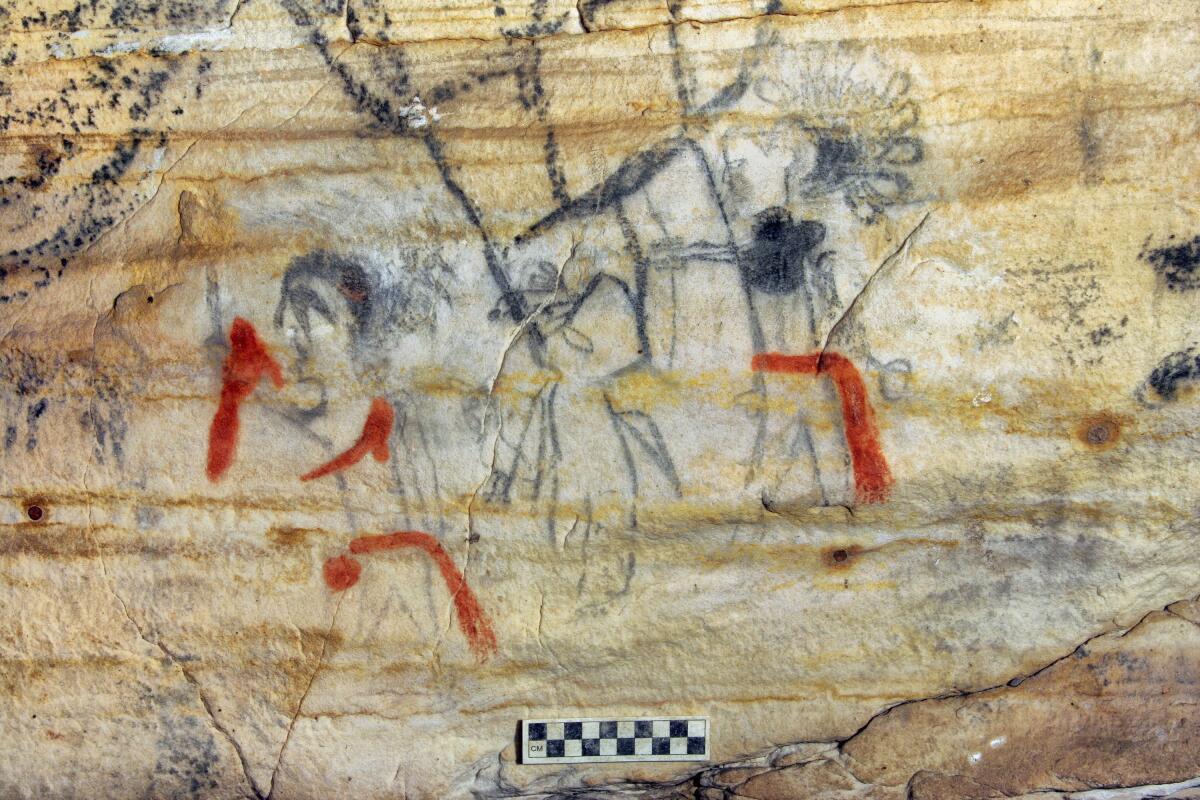Missouri cave with ancient Native American drawings is sold

O'FALLON, Mo. — A Missouri cave containing Native American artwork from more than 1,000 years ago was sold at auction Tuesday, disappointing leaders of the Osage Nation who hoped to buy the land to “protect and preserve our most sacred site.”
A bidder agreed to pay $2.2 million to private owners for what’s known as Picture Cave, along with the 43 hilly acres that surround it near the town of Warrenton, about 60 miles west of St. Louis.
Bryan Laughlin, director of Selkirk Auctioneers & Appraisers, the St. Louis-based firm handling the auction, said the winning bidder declined to be named. A St. Louis family that has owned the land since 1953 has used it mainly for hunting.
The cave was the site of sacred rituals and burials of the dead. It contains more than 290 prehistoric glyphs, or symbols used to represent sounds or meanings, “making it the largest collection of indigenous people’s polychrome paintings in Missouri,” according to the auction website.
That’s exactly why Carol Diaz-Granados opposed the sale. She and her husband, James Duncan, spent 20 years researching the cave and wrote a book about it. Diaz-Granados is a research associate in the anthropology department at Washington University in St. Louis, and Duncan is a scholar in Osage oral history.
“Auctioning off a sacred American Indian site truly sends the wrong message,” Diaz-Granados said. “It’s like auctioning off the Sistine Chapel.”
The Osage Nation, in a statement, called the sale “truly heartbreaking.”
“Our ancestors lived in this area for 1,300 years,” the statement said. “This was our land. We have hundreds of thousands of our ancestors buried throughout Missouri and Illinois, including Picture Cave.”
The cave features drawings of people, animals, birds and mythical creatures. Diaz-Granados said the art was created by various means; drawings were made with charred botanical material, while for one depiction of a mythical being, the artist created a white figure by scraping off the brown sandstone.
Diaz-Granados said the details set the Missouri cave apart from other sites with ancient drawings.
“You get stick figures in other rock art sites, or maybe one little feather on the top of the head or a figure holding a weapon,” she said. “But in Picture Cave, you get actual clothing details, headdress details, feathers, weapons. It’s truly amazing.”
Years ago, analytical chemists from Texas A&M University tested pigment samples to determine that the drawings were at least 1,000 years old.
The cave has other remnants of history, too, Laughlin said: European explorers visited in the 1700s and wrote the name of the ship captain and crew members on the walls.
The cave is also the year-round home to endangered Indiana gray bats.
Laughlin said there are plenty of reasons to believe the cave will remain protected and respected.
For one, he said, the auction house vetted potential buyers.
Then there’s the law. Missouri Revised Statute 194.410 states that any person or entity that “knowingly disturbs, destroys, vandalizes, or damages a marked or unmarked human burial site commits a class D felony.” The statute also makes it a felony to profit from cultural items obtained from the site.
Finally, there’s the location.
“You can’t take a vehicle and just drive up to the cave. You have to actually trek through the woods to higher ground,” Laughlin said. Access to the cave is by a 3-foot-by-3-foot opening.
Diaz-Granados is holding out hope that the new owner will donate the site to the Osage Nation.
“That’s their cave,” she said. “That’s their sacred shrine, and it should go back to them.”
More to Read
Sign up for Essential California
The most important California stories and recommendations in your inbox every morning.
You may occasionally receive promotional content from the Los Angeles Times.









